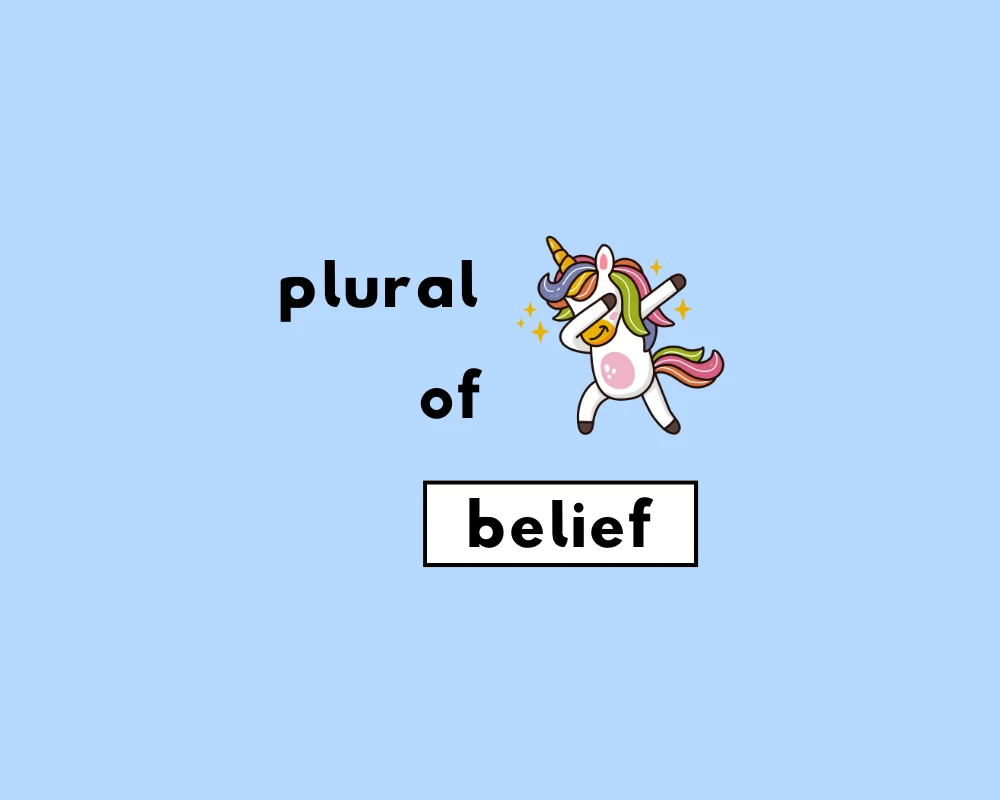What’s the plural of “belief”?
The plural form of the noun belief is beliefs. Believes is a verb and the third person singular form of believe.
His personal belief guided his decisions.
They held different beliefs about the future.
She beliefs he is telling the truth.
His deepest believe was in hard work.
What’s the singular for belief?
The singular of belief is belief.
What does belief mean?
Merriam-Webster defines the word belief as:
A state or habit of mind in which trust or confidence is placed in some person or thing.” By comparison, the Cambridge dictionary defines belief as, “the feeling of being certain that something exists or is true: His belief in God gave him hope during difficult times.“
Other words ending in -f or -ff / -s
| singular | plural |
|---|---|
| roof | roofs |
| cliff | cliffs |
| proof | proofs |
| chief | chiefs |
| belief | beliefs |
**believes** is the verb form, link the ‘v’ in ‘believes’ to the ‘v’ in ‘verb’. **Beliefs** (plural) is always a noun.
Examples of belief used in context
1. The belief exercises a potent moral influence.
2. The loss of the belief casts a dark shadow over the present life.
3. What she’s telling me is beyond belief and yet I know this ability exists.
4. I was relieved beyond belief and nearly in tears.
5. Objections to the belief in immortality have been advanced from the standpoints of materialism, naturalism, pessimism and pantheism.
Examples of beliefs used in context
1. For these beliefs and practices the Doukhobors long endured cruel persecution.
2. The people are remarkably conservative in beliefs, superstitions and traditions.
3. The past few days had turned her beliefs on end.
4. And who was she to deprive him because of her beliefs?
5. Both social traditions and the religious beliefs of the people encouraged fecundity.
Synonyms for belief
- acceptance
- notion
- confidence
- trust
- faith
- hope
- position
- knowledge
- judgment
- view
Origin of the word belief
From etymonline on belief:
“Late 12c., bileave, “confidence reposed in a person or thing; faith in a religion,” replacing Old English geleafa “belief, faith,” from West Germanic *ga-laubon “to hold dear, esteem, trust”.
What’s the difference between they’re, their, and there?
Work Sheet
What is the correct plural form of the noun “belief”?
According to the post, which word is the third person singular form of the verb “believe”?
Which sentence from the blog post correctly uses a form of “belief”?
Based on the examples provided, which word forms its plural similarly to “belief”?
In the sentence “She believes he is telling the truth,” what part of speech is “believes”?
His deep in justice drove him to act.
They discussed their differing about politics.
He everything his teacher tells him.
Her that she can succeed is very strong.
The church holds many ancient .
Frequently Asked Questions
What is the plural of belief?
+
What is the singular of belief?
+
Difference between beliefs and believes?
+
When to use beliefs vs believes?
+
How to remember beliefs vs believes?
+
Yash, D. "What’s the Plural of Belief?." Grammarflex, Jun 22, 2025, https://www.grammarflex.com/whats-the-plural-of-belief/.
Sources
-
Origin of the word belief.











